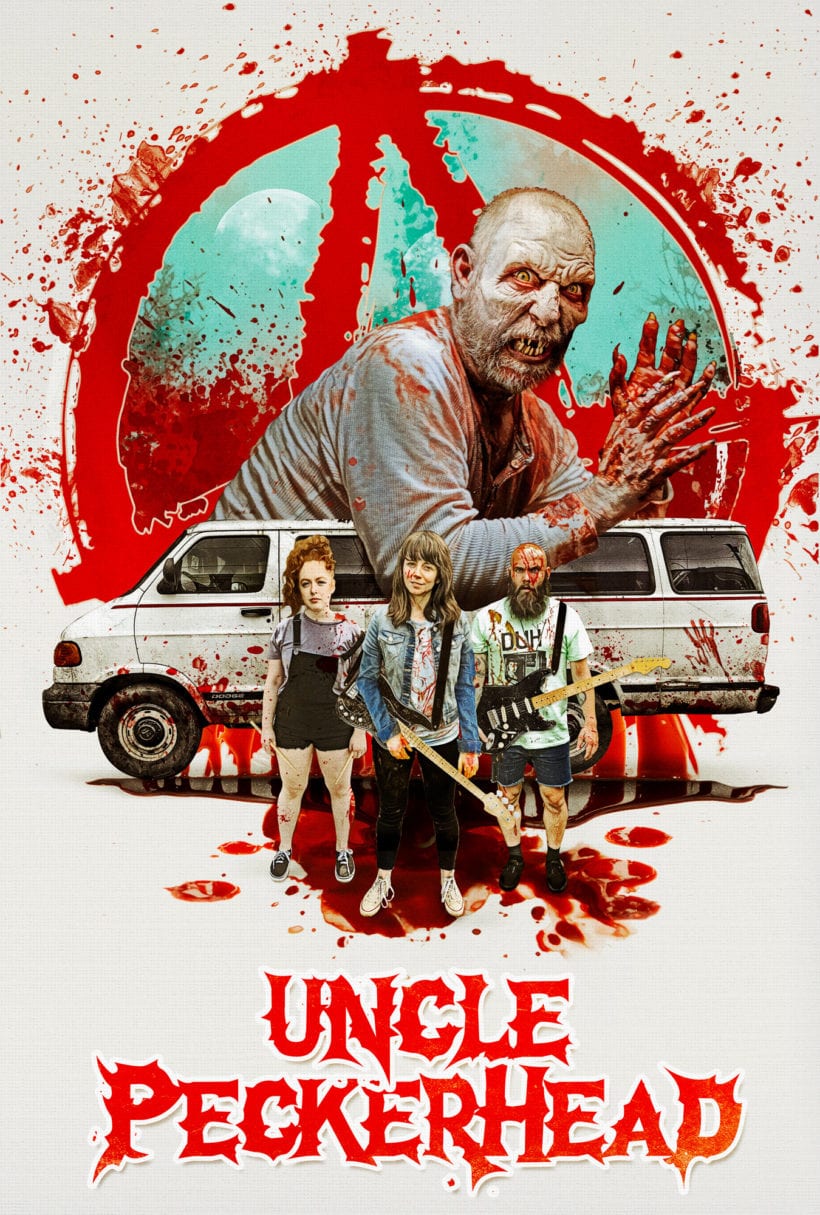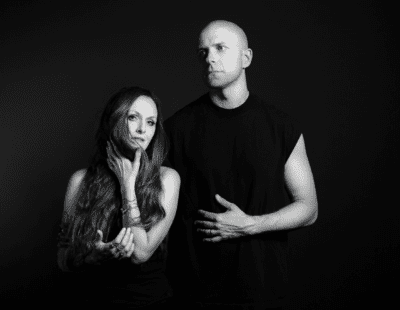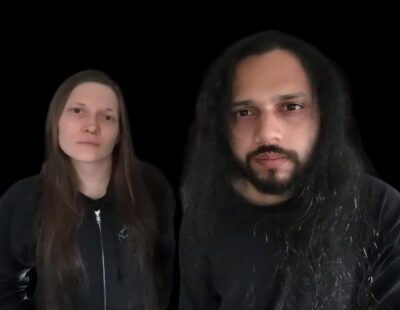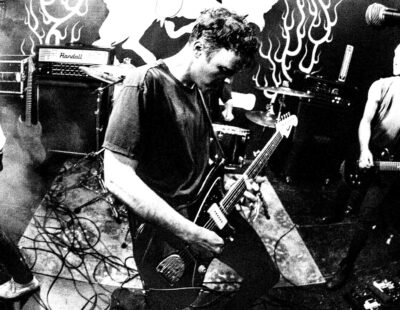
My little love I am not around
I’ve taken lost and I don’t wanna be found
There’s a lot that is wrong in this world and me
There’s a hole in my chest where my heart used to be
There words from the track “Trash Art” by now-defunct killer Husker Du-by-way-of-Dinosaur-Jr-by-way-of-Avail Philadelphia outfit The Holy Mess kept rolling around in writer/director Matthew John Lawrence’s head as he worked his way through the script for what would become the sly, enlivening, deliriously entertaining, sometimes shocking, paradoxically life-affirming punk rock horror comedy Uncle Peckerhead, in which the eponymous tour-salvaging roadie (David Littleton) who seems heaven-sent for a hungry young noise punk band named DUH turns out to be partially possessed by a demon from the deepest pit of Hell…even hungrier for human flesh.
“When I started writing Uncle Peckerhead, the first draft had the same ending you see in the film,” Lawrence tells Decibel. “And I knew I had to have ‘Trash Age’ close it out. To me, that lyric in particular was a perfect distillation of Peckerhead. [Former The Holy Mess guitarist/vocalist] Jeff [Riddle] has such a knack for writing incredibly catchy, accessible songs. Songs that carry a lot of weight but don’t leave the listener bloated with heavy-handed lyrics or Guitar Center riffs. His melodies have taken residence in my brain for my remaining years — and I’m okay with that.”
Eventually, Riddle came aboard Uncle Peckerhead to both play DUH’s introverted off-stage, luminously liberated onstage guitarist onstage Max and co-produce the film — and, much to Lawrence’s joy, he agreed to not only sign off on the use of “Trash Age” but also write and record an entire DUH demo.
“He sent me a demo version of ‘Too High to Cry Too Rare to Care’ a few days later and I probably listened to that song — no exaggeration — about seventy to eighty times the day I received it,” Lawrence says. “Even now, after spending almost three years with DUH’s music, I still love those songs. And I edited the fucker! I cannot count the number of times I had to listen to each one from pre to post production. Still. So. Good. But I digress…”
It’s actually not a digression, however — the DUH jams are actually for-real really fucking great.
And this greatness proves so essential to the success of Uncle Peckerhead: There’s already horror and zaniness — a bunch of throwaway songs would’ve likely diminished the foundational authenticity of the film, muting its power and minimizing the ability of audiences to suspend disbelief. Instead, the live performances sizzle with authenticity and a real sense of urgency. You see why the alchemy and beautiful volatility is so hard for the band — which also includes an absolutely lovely, rousing, nuanced performances from Chet Siegel as bassist/vocalist Judy and wry, hilarious turn from Ruby McCollister as drummer Mel — to walk away from even when their rapid ascent is aided by demonic carnage.
“Those demos Jeff recorded helped to convince people to join our band of misfits and make this movie,” Lawrence says. “It demonstrated that we were serious, this was real, and we already had insanely talented people attached to the project. Jeff was there from the beginning and without him there would have been no movie. Jeff is a beautiful soul and I am so stoked that people are loving on his music like I have for so many years.”
Decibel caught up with Riddle earlier this week for a wild, fun conversation on his musical background, DUH, creating “real not corny movie band songs” for Peckerhead, and his sure-to-slay new band Five Hundred Bucks.
Uncle Peckerhead is now streaming OnDemand via all the usual suspects and out on DVD next week.
Tell me a bit about your musical background — first musical loves, discovering the more aggressive/outré side of rock, etcetera — and how that morphed from observer to participant.
I can actually pinpoint the first time I heard the music that would change the course of my life forever and as cliche as it may sound it was when I heard Nirvana. I was probably around seven or eight years old and I remember my friend Kyle’s dad had a Nevermind cassette tape and we used to just listen to it in his room non-stop. I got this overwhelming feeling one day where I knew had to have this tape for myself and listen to it more at home and I actually asked him if I could borrow the tape and he said, “No my dad would kill me.” And I believed him because his dad was a Navy Seal who apparently had killed someone in a bar fight one time. Now, I detest stealing, but something came over me and I needed to have it so badly that I just took it and I felt like it was worth getting skinned alive by a Navy Seal for it. I just listened to that tape alone in my room on repeat. It was the first time that I remember being like, “Oh there’s music out there other than what mom and dad listen to in the car — and it’s way fucking better.”
Not too far down the line, I had to go to Philadelphia for a funeral and that’s where I ran into my older cousin. He was like 13 and was into playing guitar and showed me bands like The Ramones, The Dead Boys, Green Day, Black Flag, and so on. I was only there for like five days and tried to absorb as much as I could from my cousin’s tape collection and it blew my little fucking head off it’s shoulders. I returned to my hometown of Goose Creek, South Carolina — it’s a real place — and knew that I wanted to just play in a band. I didn’t care about being famous or even good, I just wanted to play music.
I started a band with some of my friends when I was about 14 and we sucked and it was great. We got better at our instruments and getting into trouble as the years went on. This is where a lot of my “tacklin’ fuel” came from for my character when it was time to play Max in Uncle Peckerhead. Eventually our band got to a point where I wanted to keep touring and playing shows and my friends wanted to do real things with their lives. Smart decision, honestly. I made an acoustic record which was basically just punk songs without a band and I lived in my car for a year and change only playing shows and selling that CD for money. I would play anywhere. I mean anywhere. It was one of the most fun times in my life, honestly. It was dangerous and I didn’t know where my next meal or tank of gas was coming from. One time I played a sushi shop in a college town in the South. I didn’t know anybody there and while I was playing I was telling this crowd of drunk college dorks about how I hate cops and some drunk lady came up and started shoving me and had the Chief of Police on speaker phone and put me on the phone with him. I told him to go fuck himself and threw the phone across the room. All I heard after that was yelling. I had to get out of there because a bunch of jocks wanted to beat my ass. Oh, the good old days.
Not too long after that I moved to Philadelphia and started playing in some bands such as Scarier Area and The Holy Mess. I even put out an actual acoustic record that wasn’t just me yelling over an acoustic guitar in an apartment. Did some touring put out some records and now here we are.

You’re pretty deeply intertwined with the Uncle Peckerhead epic — producer, actor, creating the band’s music — but going by IMDB it looks like this is your first feature. Is working in film something you always wanted to do? Or was Peckerhead a target of opportunity?
Yeah this was the first feature I’ve done. I’ve always thought it would be so cool to create some kind of show or be involved with filmmaking to some degree but it always seemed like something that was so unattainable and out there that I never really seriously considered it. I met Matt Lawrence back in like 2011 or 2012 because I was friends with his brother, Mike. Matt asked if I would be interested in acting in his short — which became Larry Gone Demon — and I was like, “Yeah of course.” I didn’t really take his request seriously and was so naive to the whole thing. I honestly didn’t think he would ever really call me to do it. I think he asked me at a party at the old Luther house in Philadelphia. About a year and a half or so later I get a call and it’s Matt and he was like, “Okay, you ready to do it now? I’ll send you the script.” I was like, “Oh shit, he wasn’t kidding. I have to do this now.”
I’m so glad I did because it turned a key in my brain and opened up a whole new chapter and like a whole new world that I never thought I’d actually get the chance to be a part of. Since then, Matt and I have gone on to become best friends and when he asked me to do Uncle Peckerhead I didn’t have a second of hesitation or doubt in my mind. Matt is a great director and producer and after what I saw him accomplish with Larry Gone Demon, and especially now working on Uncle Peckerhead together, we’ve been through the shit together and I’d follow him into the fire any day. I hope he’s not reading this.
Did you have fun putting it together? Did you feel similarly that it had to be “real,” not just an approximation of what a noise-punk band would play?
I really enjoyed writing the music for DUH because it was the first time I had written with any kind of direction. Matt sent me the script and wanted to use a song of mine that he really liked and I was like, “Yeah that’s cool, but what if I wrote a whole EP for this band? Like make the songs real and not corny movie band songs.” I really couldn’t see doing it any other way. Matt didn’t so much give me direction on how the songs should sound, but we would talk about things like mood or what was happening in a scene and it kind of informed my decisions on what the tone of the song would be for a given part. I wanted the songs to be authentic but I wasn’t “trying to make them feel authentic”. I guess the songs are all filtering through me and are just an extension of how I write and the experiences I’ve had in my life and it was fitting when making a real record for a fake band.
One great thing about your character, who has this self-empowerment arc, is that, while obviously Peck helps draw him out of his shell, there is also this idea that will resonate with a lot of fans of underground music that these various scenes are — at their best — places where people can find the security and community to self-actualize. Sorry if that’s overthinking it, but I’m just curious as someone who plays music and obviously has a deep grounding in it whether there was something special to you in that sense about your character?
Absolutely! I mean, my character is shy and awkward and weird and lovable. He is like this timid creature that really only comes into his own when he is on stage and then sort of turns into whole a different person when he’s playing music. There is also the dynamic that when he is around his best friends, his bandmates, he can let his guard down and be himself. I feel like he is the little brother and his two big sisters are kind of always protecting him and looking out for him because he’s just an affable fragile person. David [Littleton]’s character Peck also is longing for that sense of belonging and just fits right in with this crew of weirdos. Punk has always been a beacon for people who don’t fit in and we just wanted to show that anybody can do it. You don’t have to be good, you don’t have to be pretty, you don’t have to be cool. Like, fuck the gatekeepery, punker than thou, jock bullshit. I’ve never gotten down with any of that. This movie is for the freaks, and I think there is something about the story and characters that almost everyone can relate to.
Did your co-stars have a musical background? Did you have good chemistry in those live scenes with them?
Chet Siegel and Ruby McCollister first off are dreams to work with and learn from. We became instant friends. They didn’t have any real musical background per-se, but I made videos of me playing the songs with like close ups of chord patterns and how they looked on the neck. I think Ruby took a month of drum lessons. William Francis Orender who is in my real band, Five Hundred Bucks, played the drums on the recordings of these songs and also made videos for Ruby to practice with. I remember them both being a little nervous on our first day of filming a band scene and I sort of had a huddle with them and told them, “Guys, we’re making the best kind of music. It’s punk music. You don’t have to be good. Just have a good time. I fuck up all the time at shows. It’s the best part. Just have a good time, that’s all that matters.” I think that really set the tone for the rest of the film because they fucking crushed it and we all just had a blast. That’s my real van in the movie, my real house that we filmed in for DUH’s house — it looks better now, I promise — and all my band gear. We were like a real band. I shared a room with David, and Ruby and Chet lived together at an AirBnB. I would go pick them up every morning. I drove the cast around in my van and we just blasted punk music and would roll up to different locations and it really felt like we were a band on tour.
What’s up with your current band?
William Francis Orender who played the drums for all the DUH songs and I have a band together called Five Hundred Bucks. It’s a pretty new project but we have a song out that you can listen to wherever you do that. We have a full record we recorded with Jeff Leonard Jr. and Eric Rickert that I’m stoked on and a 7” that’s getting pressed right now that we are self-releasing and we should have that back any day now. If anyone wants to put the LP out holler at us.
Are you hoping to make more films?
I would love to be involved in filmmaking in any way possible. We have a little production company called Subtle T-Rex if someone wants to give us some money to make something else, we have ideas and we’re all ears.
I’m curious: What’s Jeff Riddle’s day to day life like?
My day to day life right now consists of waking up, doing the hippie speedball — a spliff and some strong coffee — watering my plants, hiking with my dog, writing music and working on script ideas, rinsing and repeating. This pandemic has made me incredibly fucking boring…er.
Finally, Uncle Peckerhead seems to leave the door open for a sequel. Is that a thought?
Well you know what they say, when Uncle Peckerhead leaves a door open, I guess I’m paying to cool off the whole fucking neighborhood.







